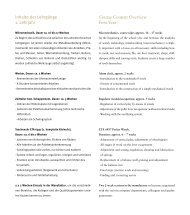2009 Momentum - Glashütte Original
2009 Momentum - Glashütte Original
2009 Momentum - Glashütte Original
Create successful ePaper yourself
Turn your PDF publications into a flip-book with our unique Google optimized e-Paper software.
42 <strong>Momentum</strong> 1· <strong>2009</strong><br />
Tendence Time and dream<br />
to relate their dreams to family and friends is very familiar with<br />
that frustrating feeling of not being able to properly describe them<br />
using mere words. Dreams are very hard to pin down. Petra<br />
Gehring, a professor of theoretical philosophy, says, “Dreams are<br />
fascinating. We want to dissect them and analyse them, yet they<br />
seem to slip from our grasp; they are remote from science, unreal,<br />
misty and obscure.”<br />
The stuff of which dreams are made usually comes<br />
from the specific memory and experiences of the sleeper. Dr. Michael<br />
Schredl, head of the sleep laboratory at Mannheim University’s<br />
Central Institute of Mental Health: “Many different things leave<br />
impressions on our subconscious minds; everything we see and<br />
experience, from our own upbringing to the mass media, is stored<br />
in our memories, which our dreams then dip into. That means that<br />
our dreams are influenced to a large degree by our culture.”<br />
Nocturnal journeys into history such as that experienced by Alfred<br />
Maury are rare – as are dreams that take us to past events in our<br />
own lives. Contrary to popular belief, elderly people do not dream<br />
about their childhood any more frequently than young people do.<br />
What is quite common, however, is for us to dream of certain elements<br />
from our past, such as our old school, the house where we<br />
lived as a child, or friends and acquaintances from long ago.<br />
“But,” Schredl tells us, “the subjective feeling of being younger in<br />
our dreams than we are in real life is not very common. Dreams<br />
usually take place in the present.” He goes on to explain that in<br />
our dreams we are usually pretty much the same person as we<br />
are in our waking lives. “Dreams that are set in the future are rare,<br />
too. Dreams tend to pick up on those topics that are of current<br />
relevance to our lives – though not always in the form of obvious<br />
images; dreams reflect the way we feel about things we have<br />
experienced that day.” And these dreams therefore often really do<br />
just address mundane everyday occurrences – refuting Nietzsche’s<br />
claim that “Either one does not dream at all, or one dreams in an<br />
interesting manner.”<br />
But while the average dreamer primarily tackles the same issues<br />
in her sleep that have been occupying her throughout the day,<br />
there are people who seem to spend most of the night dreaming<br />
and who report that throughout their dreams different dream ele-<br />
ments and temporal levels interweave in fascinating ways; according<br />
to their recollections, their dreams have their own past, present<br />
and future. “These people even dream of things that they have<br />
seen in earlier dreams, things they have never set eyes on in their<br />
waking lives,” Schredl reports.<br />
During our dreams we do not find anything particularly<br />
peculiar about leaps in time or illogical events. Our current<br />
partner morphs to become a previous lover, our own house is<br />
suddenly placed in an unfamiliar setting, a friend who died many<br />
years ago is engaging us in a compelling conversation – all perfectly<br />
normal. According to neurologist Michel Jouvet, the fact that<br />
we regard such paradoxes as normal has a scientific foundation.<br />
He states that certain neurons in our brain need to switch off<br />
every once in a while to regenerate, although others do not. Thus,<br />
while we sleep, those neurons that allow us to think critically are<br />
also out for the count.<br />
Much of the field of sleep research remains a mystery, but there is<br />
one thing that scientists can agree on: not only are dreams meaningful,<br />
they are also essential for maintaining health. Experiments<br />
during which the test subjects were not allowed to enter REM<br />
sleep revealed that without dreams we become irritable, de pressed<br />
and at severe risk of mental and physical illness. So, dreaming is<br />
a good thing.<br />
The actual function of dreaming is a topic of speculation for scientists,<br />
religious scholars and philosophers. Whatever their purpose,<br />
dreams can enrich the life of anyone who recalls them, ponders<br />
their meaning and discusses them with friends or writes them<br />
down. They expand our horizons, introduce us to unexplored<br />
levels of consciousness and encourage us to look at things differ -<br />
ently. The alert dreamer can profit from addressing the topics that<br />
come up in his or her dreams – and may thus be better prepared<br />
for the future. ✺

















